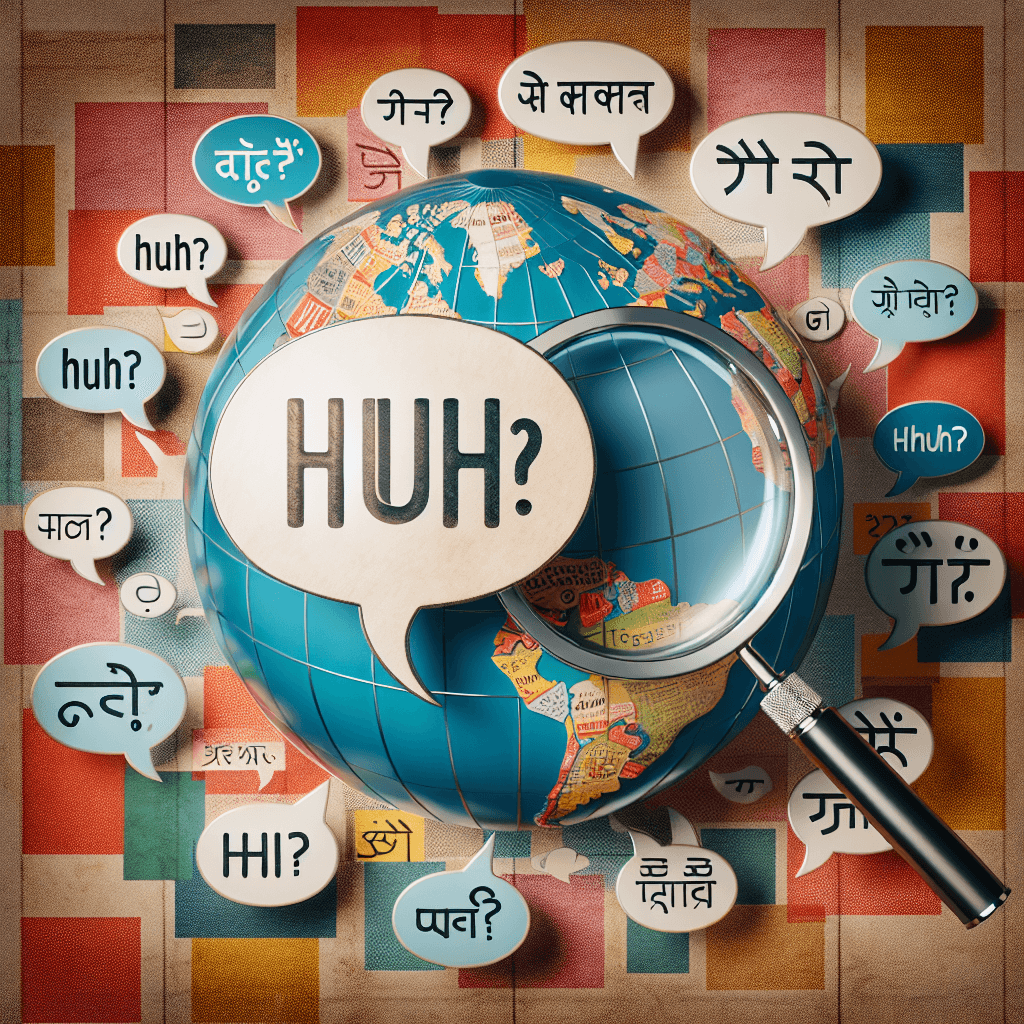Why is the sound 'huh' a nearly universal word across most human languages
It's not a coincidence that this simple sound is understood in nearly every language; it's a perfectly evolved tool essential for human conversation.


Too Long; Didn't Read
TLDR: The sound huh is not an innate word, but a product of convergent evolution. It is the simplest and most efficient sound humans can make to quickly signal a lack of understanding, so most languages independently arrived at this same solution for a common conversational problem.
From English to Mandarin: Why is the Sound 'Huh' a Nearly Universal Word Across Most Human Languages?
What’s the one word you could use almost anywhere on Earth and be understood, even if you don’t speak the local language? It’s not "hello" or "taxi." It's the simple, almost reflexive sound we make when we’re confused or didn’t quite catch what someone said: "Huh?" This seemingly insignificant grunt is, in fact, one of the most remarkable words in human communication. While languages vary wildly in their vocabulary and grammar, some form of "huh?" appears in tongues as diverse as Icelandic, Spanish, Lao, and the indigenous Cha'palaa of Ecuador. This blog post will explore the fascinating linguistic research that explains why this humble sound is a nearly universal word, revealing how it’s not an accident, but a brilliant piece of conversational engineering.
More Than a Grunt: Is 'Huh?' a Real Word?
First, let's clear up a common misconception. "Huh?" isn't just a mindless noise like a sneeze or a cough. Linguists classify it as a true word—specifically, an interjection. How do we know? Unlike involuntary sounds, we learn to say "huh?" as we acquire language. We use it in a specific grammatical and social context: to signal a breakdown in communication and request clarification. It's a tool we consciously deploy, even if it feels automatic.
Researchers have found that while babies can grunt, they don't use a questioning "huh?" until they begin to learn the rules of conversation. This shows that "huh?" is a learned part of our linguistic toolkit, not just a primitive reflex.
The Universal Problem: Fixing a Broken Conversation
Every human conversation, in every language, is prone to error. Someone might speak too softly, a car might drive by, or we might simply mishear a word. When this happens, we need a quick, efficient way to hit the conversational pause button and say, "Hold on, I didn't get that." This is known in linguistics as initiating a "repair sequence."
The need for a quick repair initiator is a universal pressure on all languages. You need a signal that is:
- Fast: It has to be uttered immediately, before the conversation moves on.
- Easy: It can’t require complex thought or articulation, especially when you’re already busy trying to process what you just missed.
- Unambiguous: It must clearly signal a problem with understanding.
This shared problem sets the stage for a shared solution.
Convergent Evolution: The Perfect Linguistic Solution
So, if "huh?" is a learned word, why didn't every language just invent its own unique term for it? The answer lies in a concept called convergent evolution. In biology, convergent evolution is when different species independently evolve similar traits to adapt to similar environments or challenges—like how bats, birds, and insects all developed wings for flight.
A landmark study by researchers at the Max Planck Institute for Psycholinguistics found that "huh?" is a perfect example of convergent evolution in language. Languages, facing the identical pressure of needing a quick repair initiator, independently converged on the same optimal sound. "Huh?" is not a word that has been passed down from a single ancient proto-language; rather, it has been re-invented again and again across the globe because it is the most efficient possible solution to the problem.
Why This Specific Sound?
The form of "huh?" is no accident. It is shaped by what linguists call "selectional pressures" for maximum efficiency and minimum effort.
- Minimal Articulation: The "h" sound is just a quick puff of air, and the vowel is a neutral, central vowel (like the 'u' in 'uh'). To produce it, your tongue and lips are in a relaxed, default position. It's the easiest sound a human mouth can make.
- Questioning Intonation: In most of the world’s languages, a rising intonation is used to ask a question. The upward lilt of "Huh?" is a near-universal signal that you are expecting an answer.
- Brevity: It's a single, short syllable that can be deployed in a fraction of a second, perfectly designed to interrupt just enough to get your point across without derailing the conversation completely.
While there are slight variations—in Spanish it might sound more like "¿Eh?", and in Mandarin more like "Á?"—the core structure of a simple, questioning, open-vowel sound remains remarkably consistent.
Conclusion: A Word That Connects Us All
The story of "huh?" is more than a fun piece of trivia; it’s a powerful illustration of how human communication is shaped by practical needs. It shows that beneath the incredible diversity of our planet's languages, we all face the same fundamental challenges in making ourselves understood. The fact that we independently arrived at the same elegant solution is a testament to our shared cognitive and physiological wiring. So the next time you instinctively utter "huh?", take a moment to appreciate it. You're not just being inarticulate; you're using a finely tuned piece of universal linguistic technology, a word that, in its own small way, connects you to almost every other speaker on the planet.


